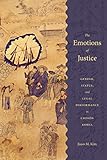The emotions of justice : gender, status, and legal performance in Chos�on Korea / Jisoo M. Kim.
Material type: TextSeries: Korean studies of the Henry M. Jackson School of International StudiesPublisher: Seattle : University of Washington Press, [2015]Copyright date: �2015Description: 1 online resourceContent type:
TextSeries: Korean studies of the Henry M. Jackson School of International StudiesPublisher: Seattle : University of Washington Press, [2015]Copyright date: �2015Description: 1 online resourceContent type: - text
- computer
- online resource
- 9780295806174
- 0295806176
- 342.519/080903 23
- KPA120 .K563 2015eb
"The Chos�on State (1392-1910) is typically portrayed as a rigid society because of its hereditary status system, slavery, and Confucian gender norms. However, The Emotions of Justice reveals a surprisingly complex picture of a judicial system that operated in a contradictory fashion by discriminating against subjects while simultaneously minimizing such discrimination. Jisoo Kim contends that the state's recognition of w�on, or the sense of being wronged, permitted subjects of different genders or statuses to interact in the legal realm and in doing so illuminates the intersection of law, emotions, and gender in premodern Korea"--Publisher's website.
Includes bibliographical references and index.
Author's note -- Kings of the Chos�on Dynasty -- The Confucian state, law, and emotions -- Gender, writing, and legal performance -- Women's grievances and their gendered narrative of w�on -- Seeking vindication or begging pardon on behalf of the living -- In search of justice on behalf of the dead.
Print version record.
English.
eBooks on EBSCOhost EBSCO eBook Subscription Academic Collection - Worldwide

